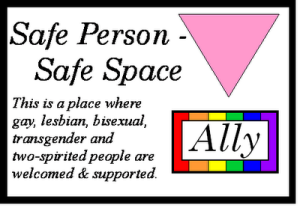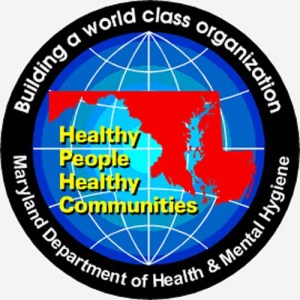For my activism project, I decided to attempt to make Baltimore Crisis Response (BCRI) a more queer- and trans-friendly public mental health provider. I have worked at Baltimore Crisis Response for a number of years as a counselor.
The services BCRI offers are extensive and varied, but include rapid mental health treatment and stabilization for clients. This treatment includes, but is not limited to, regular meetings with a psychiatrist and various mental health professionals and social workers, all while housed, fed and often medicated by the organization. There is also a rapid detox program available to people who want or need to get clean. As of recently, there is also rapid HIV testing available to all clients (previously this was limited to individuals in the detox program). All of these services are free of charge to the individuals who receive them.
Very often BCRI treats individuals with substance abuse issues and individuals without sufficient and steady housing, as well as deficiencies in other crucial resources necessary for good health. Baltimore’s queer and trans populations are more likely to be afflicted by crises like these related to substance abuse, mental illness and homelessness. This has to do, in large part, because these populations receive differential treatment from most state-controlled institutions that distribute resources and life chances, and are more likely to be afflicted by familial, social and societal stressors. For instance, police disproportionately harass and assault queer and trans folks, and many hospitals treat queer and trans patients in such a way that they are not safe spaces or effective treatment providers for these populations.
BCRI, though very unique in a number of regards, reproduces a number of harmful gender and sexuality norms simply because they are the standard in the public health and public mental health fields, as well as in mainstream society otherwise. However, this makes these transgressions against these populations no less harmful and problematic. Currently, BCRI has a status as a truly unique and cutting-edge program for rapid mental health and drug treatment, and I hope I can be instrumental in making it as cutting-edge of a program in its treatment of sexual minorities.
It is important to point out here, that I do not mean to portray these populations as being without agency and strength, that need our help because they are helpless. My investment in this progress is professional and personal. This is not about “us” helping “them.” This about one of us reaching out to others of us. As a queer-identifying person, I do not claim to be really deeply similar to all other queer-identifying people, nor do I aim to be a savior for anyone. However, I have struggled with mental illness as a queer person and have been fortunate enough to receive moderately good help from people who simply wanted to help me. As to not take that for granted, and pass along that positivity, I want to try and make things a little bit better in this small way because it is important to me.
It will start with just making basic aesthetic changes: maybe a “safe space,” sign here some trans-specific health pamphlets there; small, but important, modifications to forms and educational resources, etc. But, by this July, I plan to, with the help of a truly fantastic individual I’ve been working with from the Department of Health and Mental Hygiene (weirdest name ever), start having basic trainings about how to create a safer space in a really broad sense for sexual minorities. These trainings will include things like how to talk about sex and sexual violence in a way such that individuals feel safe, learning about what triggers are and how to address them, ways to talk about sex and relationships in non-hetero-prescriptive ways, and various other things that will make staff better at their jobs in general, for all clients, but especially with regards to our ability to treat sexual minorities. These trainings will be mandatory (but fun!!), and because they are being provided by DHMH, which is a state-run operation, they will be free of charge to BCRI (yay!).
I can’t, as of yet say that this project has been successful, but I believe that, come this summer, it will prove just that. One thing I have learned about dealing with professionals who do various forms of activism, as is certainly the case for the person at DHMH with whom I’ve been working, is that they are busy! Though this may appear obvious and trite, it is important. I was first put in touch with this individual in early April, after going through a number of different venues looking for a partner with whom to work on this project. They then informed me that their earliest opening to begin such a project would be mid- or late July. And, this, coming from a person who seems just as enthused and determined about this project as I. So, starting early is very important if one endeavors to work with a partner on an activism project.
I mostly think I got lucky. The person I’m working with has been very receptive and incredibly enlightening for me already, as an activist and a thinker. This is the other important lesson I learned with regards to such projects: especially as a student, one is more connected than they could ever imagine. I initially had a relatively limited understanding of my personal connections and resources, but, through talking about the project with people who I assumed to be like-minded in this particular realm of politics, I was put in touch with a chain of people that lead me to a dedicated and inspiring (and free!) activist with whom I will hopefully continue to work on a number of different projects.




